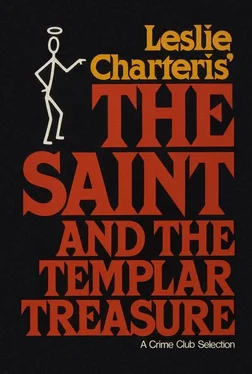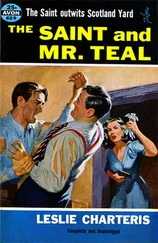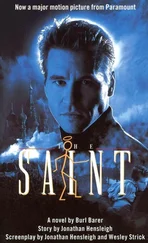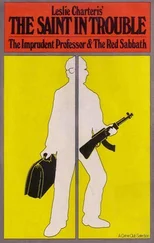“Bonjour, Gaston,” Simon said heartily. “I’m afraid I’m not very early. Is Mimette around?”
“Yes, she is at the barn. Is your car repaired yet?”
“No. It needs a new radiator, and the mechanic says he won’t be able to get hold of one for some days,” the Saint replied, glibly combining fact and fiction.
His answer seemed to distress the old man. Gaston shuffled his feet nervously and looked back up the path as if he was afraid of being followed.
“What is the matter?” Simon asked.
For a while the foreman said nothing but simply stared searchingly at the Saint. When he finally spoke there was no mistaking the earnestness behind his words.
“Do not wait for your car, Monsieur Templar. Go now. Go while you still can.”
“What is that supposed to mean?” Simon demanded.
“I cannot explain but I hope you will listen,” Gaston pleaded. “Go now, or you may not leave Ingare alive.”
At any other time such a melodramatic prognostication might have made the Saint laugh, but he did not even smile as he realised the change that had come over Gaston Pichot in the twelve hours since they had chatted so casually together at dinner. Then the old overseer had been eager to begin the harvest, and his greatest worry had been the quality and quantity of the coming vintage. Now he seemed bowed by cares he was not used to bearing and he was afraid. It was the fear in the old man’s eyes which the Saint found so hard to understand and which made him appreciate the seriousness of the warning. The Saint’s survival had often depended on his ability to judge a man’s character on the briefest of encounters, and he knew that Gaston Pichot was not usually given to displays of dramatics or of fear. Men who jump at shadows do not survive five years in the Resistance.
Gaston seemed to read the answer to his advice in the Saint’s face. He sighed deeply and shook his head.
“But you will not leave,” he stated flatly. “I knew that you wouldn’t, but it was my duty to warn, perhaps, an old comrade.”
He started to walk away but the Saint stopped him.
“Warn me of what, Gaston? Who is going to do me in?”
“Would it make any difference if I told you?”
The Saint smiled.
“Probably not, but it might save me from coming to an untimely end.”
Gaston waved a hand towards the slopes where the grapes were being gathered.
“The men have heard what happened at the séance last night. I don’t know how. I did not know about it myself until one of them told me. It was a foolish thing to do. They are very superstitious and the tale has grown with the telling. They are saying that the Templar curse is coming true and that your arrival is linked with it. The burning of the barn has worried them. If anything else happens I am afraid of what they might do.”
Despite the other’s obvious sincerity, the Saint found it hard to take that threat seriously.
“What are you suggesting? A lynch mob?”
“With a mob, you never know,” Gaston replied gravely. “But I do not think it is only them you have to fear.”
“Who, then?” Simon persisted. “Philippe?”
Gaston shook off his detaining hand.
“I have said enough already. Perhaps too much. I could be wrong.”
Again he began to walk away, and this time the Saint did not try to stop him. He knew instinctively that however hard he pressed his questions he would find out nothing more. He stood and watched the overseer trudge stolidly up the hill towards the château before he continued his own journey.
He played back the conversation in his mind as he walked, analysing every word and gesture in an attempt to understand what could have prompted Gaston’s action. He only half believed the story of unrest among labourers in the vineyard. Superstitious they might be, but he doubted that their fears would be translated into any action that could endanger him. If Gaston had used their threat as a blind, then there was only one plausible alternative: that he was trying to protect someone else, not from what they had done, but from what they might do.
The smoke-blackened ruin of the chai was the centre of activity. The inside had been cleared, and the debris of the fire piled against the walls. Mimette stood beside the truck, supervising its loading as the labourers humped their baskets of grapes from the surrounding fields and emptied them into the rows of bins lined up by the tail-board.
“How’s it going?” Simon asked cheerily.
“Very well,” she replied, wiping her forehead with the sleeve of her blouse. “It should be a bumper crop this year. God knows we need one.”
He slipped off his jacket and began rolling up his sleeves.
“Where shall I start?”
“Start?” Mimette repeated blankly.
“Yes, start. You know — begin, commence, proceed, get down to it, et cetera.”
“You mean you want to help with the harvest?”
“But of course,” he said indignantly. “If I can’t sing for my supper I’ll pick for it.”
“You’re not exactly dressed for work,” she protested, and he admitted to himself that most vineyard workers do not clock on wearing silk shirts and Savile Row trousers.
He lowered his voice confidentially.
“My tailors would have coronaries, but if you don’t tell them I won’t.”
Mimette handed him a basket. She led him to a row of vines and briefly instructed him in the correct method of clipping the bunches.
“And if I see you slacking I’ll dock your pay,” she told him sternly.
The Saint tucked his forelock.
“Oui, mademoiselle,” he said humbly, in a creditable imitation of the local accent.
She laughed as she left him to his work. He had had no intention of lending a hand when he left the château. The idea had been spontaneous. He believed in collecting experiences. He had never taken part in a grape harvest. Here was a grape harvest, so why not take part?
He discovered that grape picking was far harder work than it appeared and it tested even his stamina. After two hours of non-stop toil in the heat of the day he had managed to locate muscles he had forgotten existed, and his hands and arms were stained a dark purple from the juice that burst from the ripe fruit.
He talked to the other pickers as he carried his basket to and from the truck. Including Pascal and Jules, they were respectful and distant — and, he guessed, suspicious of his working among them. But there was no sign of the hostility that Gaston had tried to hint about.
A halt was called at midday and he sat beside Mimette in the shade of the cypress trees, tucking in to coarse bread, saucisson, strong cheese, and vin very ordinaire with the same relish as if it had been a meal at Maxim’s. When both hunger and thirst had been sated, he told her of his encounter with Jeanne Corday.
“I heard that she arrived this morning,” she said. “What is she like?”
He considered his reply carefully.
“Can you imagine a cross between Mae West, Marlene Dietrich, and a playful boa constrictor?” he inquired.
Mimette’s eyes widened incredulously.
“She can’t be such a mixture as that!”
“That’s just my impression, and don’t quote me. Where did Henri meet her?”
“In Paris, I suppose. The first I heard about it was when he wrote to Gaston saying he had become engaged.”
“I think poor old Gaston is in for a surprise,” Simon chuckled. “By the way, where is Henri?”
“I’m not sure. I think he said he was going to check the inventory at the chai.”
“And Philippe?”
Mimette scowled.
“Uncle Philippe does not believe in soiling his hands. He went into Avignon early this morning, saying he had business to attend to. I don’t care where he is as long as he keeps out of my way.”
Читать дальше












